The Hill’s Morning Report – Presented by Facebook – Senate sends $483 billion coronavirus package to House
Presented by Facebook
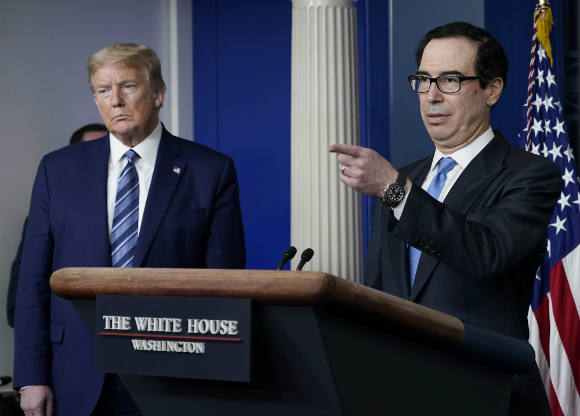
Welcome to The Hill’s Morning Report. It’s Wednesday. We get you up to speed on the most important developments in politics and policy, plus trends to watch. Alexis Simendinger and Al Weaver are the daily co-creators, so find us @asimendinger and @alweaver22 on Twitter and recommend the Morning Report to your friends. CLICK HERE to subscribe!
Total U.S. coronavirus deaths reported each morning this week: Monday, 40,683. Tuesday, 42,364. Wednesday, 45,075.
The Senate sent the House a $483.4 billion relief measure on Tuesday to bolster a depleted small-business loan program, boost coronavirus funding for hospitals and help states afford more testing. The House will vote today on the bipartisan measure, which President Trump is expected to sign this week.
The Senate passed the fourth piece of coronavirus-related legislation by unanimous consent after days of late-night negotiations between top Democratic lawmakers and Treasury Secretary Steven Mnuchin, among others.
Headlining the nearly $500 billion package is $310 billion to refill the Paycheck Protection Program (PPP) after it ran dry last week, $75 billion to allow hospitals to help treat COVID-19 patients and address drops in revenue, and $25 billion for states to increase testing capabilities (The Hill).
Mnuchin (pictured above) told reporters at the White House coronavirus task force briefing that he “would expect” that this will be the final allocation of funding for the PPP, which approaches $650 billion between the $2.2 trillion package signed into law in late March and the Senate-passed bill yesterday. However, the funding is expected to last for roughly two weeks, the same amount of time the initial round of funding lasted.
The House is expected to return to Capitol Hill on Thursday to approve the bill and send it to the president’s desk. Trump tossed his support behind the bill, saying during Tuesday’s briefing, “I urge the House to pass the bill.”
The Associated Press: Senate approves $483B virus aid deal, sends it to House.
The Wall Street Journal: What’s in the new coronavirus stimulus bill.
The New York Times: The Senate-passed measure mandates that the administration establish a national strategy to help states and localities, which must outline their own plans for testing. This provision, accompanied by $25 billion for testing, is seen as a crucial step toward gradually getting states and cities safely back to work.
Mnuchin also called on large businesses that applied for and received loans from the PPP to return them in the near future, adding that they would not be penalized if they do so.
“The intent of this money was not for big public companies that have access to capital,” Mnuchin said, adding that there will be “severe consequences” for companies that accept funds that should have gone to small businesses.
With an agreement in the rearview mirror, attention now turns to “phase four” legislation. Despite the support from some corners, including the White House and top Democrats, official talks are not expected to kick off immediately after Senate Majority Leader Mitch McConnell (R-Ky.) indicated that the Senate will not consider new legislation until it returns in full to Washington. At the earliest, the Senate will return on May 4.
“What we’re going to do is call the Senate back and have full membership here … before we consider yet another rescue package,” McConnell said (The Hill).
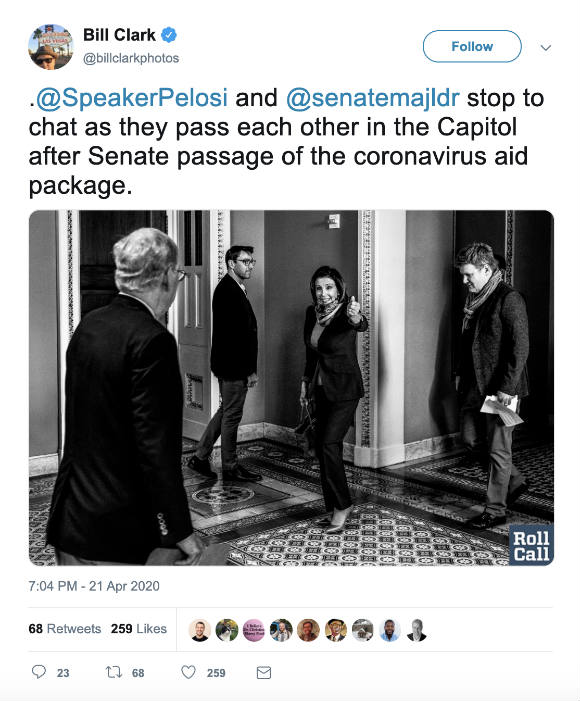
The next funding measure is expected to include more federal help for state and local governments, which was not part of the $483 billion deal. Senate Minority Leader Charles Schumer (D-N.Y.) indicated that he was pleased that the president and Mnuchin backed the funding for the next bill along with New York Gov. Andrew Cuomo (D), who has repeated said his state “is broke.”
“We should’ve passed support for state and local governments. Democrats will see that it gets done in the next package,” Schumer said on the Senate floor.
As Alexander Bolton writes, the “phase-four legislation” is expected to rival the size of the $2.2 trillion Coronavirus Aid, Relief and Economic Security Act. However, questions surround how the bill will be negotiated after Mnuchin held talks over the phone with Speaker Nancy Pelosi (D-Calif.) and Schumer in recent weeks and when Congress will return to town.
House Majority Leader Steny Hoyer (D-Md.) announced his support for the House to allow remote voting so Congress can take up legislation as the virus continues to affect the day-to-day proceedings on Capitol Hill. Hoyer said on Monday night that the House will vote on proxy voting, which would allow an absent lawmaker to authorize another member who is present in the chamber to vote on his or her behalf (The Hill).
The Senate did not follow suit on Tuesday, as McConnell blocked an attempt by Sen. Rand Paul (R-Ky.) to allow temporary remote voting in the upper chamber. Paul said on the Senate floor that Congress should either return to session or allow for remote voting to be temporarily available “if there exists too much danger to have Congress meet in person.”
McConnell objected to Paul’s attempt to pass his resolution. Before the Senate broke for a five-week recess due to the virus, the GOP leader shot down the chances the chamber would adopt remote voting.
“We’ll not be doing that. There are a number of different ways to avoid getting too many people together,” McConnell told reporters (The Hill).
The GOP leader told Politico in an interview that there will be no more long-distance attempts to hold negotiations on future COVID-19 legislation and that lawmakers should be in Washington and “engaged” in talks.
Paul Kane: House pushes toward historic change in voting procedures as pandemic sidelines Congress.
The Washington Post: Some Senate Republicans look for ways the federal government can play a bigger role in coronavirus testing.
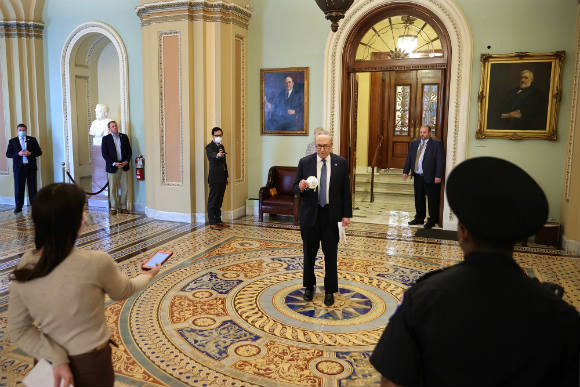
SPONSORED CONTENT — FACEBOOK
Facebook’s data tools are helping researchers better understand COVID-19
New results from a symptom survey run by Carnegie Mellon University Delphi Research Center show how data tools can support a stronger response to COVID-19.
See how Facebook is doing it, while protecting privacy.
LEADING THE DAY
ADMINISTRATION: Trump’s tweet on Monday night announcing he will temporarily suspend immigration into the United States to preserve jobs for citizens amid the coronavirus crisis raised more questions than he answered, even during a lengthy briefing on Tuesday.
The president described his pending executive order, to be unveiled this week, as a temporary, 60-day pause in “new immigration” that can be extended again later. “By pausing immigration, we put Americans first in line for jobs,” Trump said.
It’s unclear if the order is largely an affirmation of policies already in place, especially when travel to the United States is limited from most countries and U.S. border restrictions are in place with Mexico. Trump said the order will include exemptions for migrant workers hired by U.S. farmers.
The order will bar those seeking permanent residency green cards, but not temporary workers, he said (The Associated Press). Trump backed away from plans to suspend guest worker programs after business groups exploded in anger over their need for foreign workers (The New York Times).
The president said the ban was being drafted on Tuesday and could be signed today. “It’s a strong order,” he said.
Trump’s campaign on Tuesday began to tout the president’s immigration action in communications with supporters, touching on an issue of importance to his base as unemployment soars.
“The last thing we want to do is take Americans’ jobs,” he continued. “We have to have jobs for Americans.”
The Hill: Trump to suspend issuing green cards for 60 days.
The Washington Post: The administration on Tuesday drafted details of Trump’s order to suspend immigration following his tweet.
The Hill: Immigration advocates assail Trump’s approach, arguing, “Recessions and viruses do not distinguish between citizens and non-citizens.”
NBC News: Trump’s immigration ban raises plenty of questions. Here’s what we know so far.
> One good read: As Americans shoulder both a public health crisis and economic inferno, Trump will not tap the power and know-how of former living presidents, as did some of his predecessors while they were in the Oval Office. Author Kate Andersen Brower recently interviewed Trump about the fraternity he eschews for her book, “Team of Five.” She unpacks his thinking for the May issue of Vanity Fair.
> Petroleum: Oil prices continued to collapse on Tuesday, inflicting more damage on stock markets around the world. The S&P 500 closed down 3 percent on Tuesday, its second straight loss. Markets across Europe and Asia had similar drops. Oil prices crumbled again as demand for energy screeches to a halt with idled planes, cars and factories. Meanwhile, storage tanks for excess crude are filled close to their limits. Treasury yields fell, meaning investors were willing to get paid even less to get the safety of owning U.S. government bonds, a worrisome sign (The Associated Press).
The dramatic swan dive in prices may not be over (The Hill). … Trump says he backs federal relief funds for the oil industry in light of economic pain felt in states where drilling and fracking had once been lucrative (Bloomberg News).
Mnuchin on Tuesday said the president “is determined that we want to maintain our oil dependence,” but he was vague about policies the administration may seek to bolster the industry, other than saying the executive branch “may go back to Congress” following discussions between the Treasury and Energy departments.
> Massachusetts: As much as the president wants to help U.S. oil producers, he does not want federal loan money going to Harvard University (pictured below), known as a well-funded bastion of academic liberalism.
Responding to reports that Harvard received $9 million from the newly enacted federal Paycheck Protection Program, which provides loan money to small companies to help them stay afloat during the coronavirus stay-at-home orders, Trump said Harvard must return the money, or else (The Hill).
Mnuchin said his department will do a better job explaining to applicants as part of the next tranche of relief funding the definition of small businesses the government has in mind.
“I want Harvard to pay the money back,” Trump said. “They have to pay it back.”
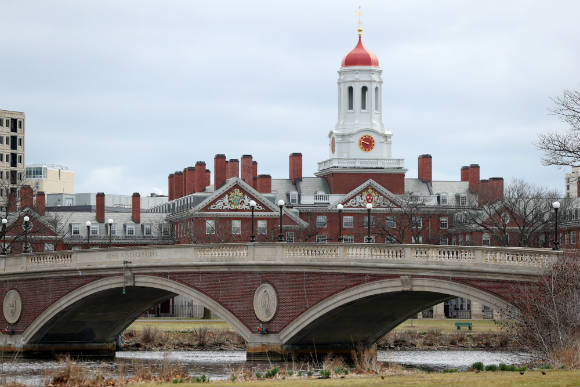
State Watch & Coronavirus: Centers for Disease Control and Prevention Director Robert Redfield, a physician, warned during an interview with The Washington Post on Tuesday that a second wave of coronavirus next winter could be devastating. For that reason, federal officials are relying on the preparations and experimentations underway now to get ready for what may be ahead.
> Georgia: Gov. Brian Kemp (R) plunged ahead this week to lift restrictions on business activity, although Georgia has a relatively high number of confirmed coronavirus cases. Kemp’s eagerness to revive his state’s economy is part of a growing political debate about how and when to safely lift public health restrictions intended to halt new outbreaks of the respiratory disease (The Hill).
Georgia is lifting restrictions on hair, nail and tattoo salons and massage parlors where social distancing is tough to pull off.
Trump commended Georgia, and Deborah Birx, the immunologist who helped write the White House phased guidelines about how to restart commerce, said, “I’m not going to judge anyone about their decision-making” while repeating that in this first phase of lifting restrictions, “social distancing is absolutely key.”
Sen. Lindsey Graham (R-S.C.), a Trump ally, says he worries that Georgia, a neighboring state, is moving too fast and too soon to lift stay-at-home restrictions. “We respect Georgia’s right to determine its own fate, but we are all in this together,” the senator tweeted on Tuesday. “What happens in Georgia will impact us in South Carolina” (The Hill).
Kemp says he has data on his side (WSB-TV).
> New York: Cuomo met with Trump on Tuesday and both men pronounced their discussion “productive.” The two powerful personalities from the Empire State focused on coronavirus testing, which the governor says is crucial to a pending decision to reopen for business in the New York, New Jersey and Connecticut region.
Cuomo wants to double COVID-19 testing to 40,000 people per day, and he repeatedly called on the federal government to help his state pay for, acquire and manage such a herculean task.
Trump says he and Congress will support additional federal funding for states and cities as part of the next major coronavirus recovery bill, likely later in the spring or summer. Cuomo described that support as satisfactory for now.
The governor said on Tuesday that New York is beginning to see lower hospitalization rates for COVID-19, even as the state’s daily death toll remains severe.
Trump, who has shown flashes of impatience as well as fascination with the media savvy Cuomo, said the federal government agreed to “work with states” on the national manufacture and distribution of COVID-19 tests.
> Washington, D.C.: Birx on Tuesday described the nation’s capital as a continuing hot spot among major cities battling the coronavirus, even as other metro areas are beginning to see declining numbers of new infections.
One victim of the pandemic in Washington is Ben’s Chili Bowl, an iconic family-owned eatery established in 1958 that is now struggling to survive as a takeout restaurant with a skeleton staff. It learned last week that its application for a small-business loan was stuck in limbo, possibly in the hands of some of the same federal workers it has served over the years (ABC News).
IN FOCUS/SHARP TAKES
INTERNATIONAL: Questions are swirling about the health of North Korean leader Kim Jong Un after U.S. news reports indicated on Monday night that he was in grave condition following a recent surgery.
The South Korean government, however, said Kim appears to be handling state affairs as usual and that it had no information about his health. Still, as Rebecca Kheel and Olivia Beavers write, the 36-year-old North Korean leader’s health is on the radar of U.S. intelligence. A top government official also said the U.S. intelligence apparatus is closely monitoring reports about the dictator.
“We’re monitoring these reports very closely,” White House national security adviser Robert O’Brien said Tuesday on “Fox & Friends.” “As you know, North Korea is a very closed society. There’s not a free press there. They’re parsimonious with the information they provide about many things, including the health of Kim Jong Un.”
There is also speculation about who would potentially succeed Kim. O’Brien told reporters it would probably be a family member but that “it’s too early to talk about that because we just don’t know what condition Chairman Kim is in.”
Reuters: North Korean media silent on Kim’s whereabouts as speculation on health rages.
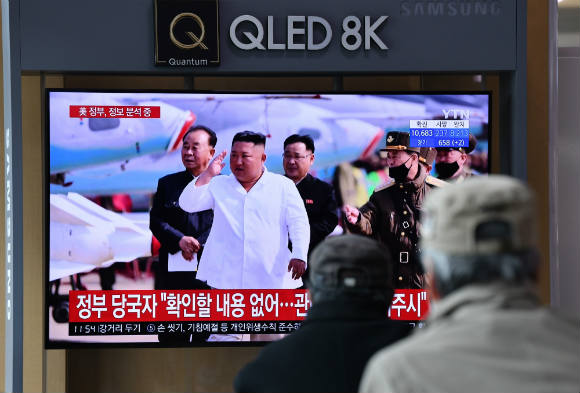
> China, South Korea, Italy: Some coronavirus patients in these countries are testing negative, then test positive again and can’t shake the virus, although most have no symptoms of illness. Isolated again for weeks (and in one case, for months) and treated as though they can spread the virus, these patients are a research puzzle; there is no medical evidence they have infected others after testing positive again themselves, but they are treated as potential spreaders. Their cases send up red flares as governments rush to return to work, school and travel. “For this disease, the unknowns are still greater than the knowns,” one Chinese health official said (Reuters).
> Germany: Munich was forced to cancel its annual Oktoberfest festival this fall due to the novel coronavirus outbreak. The two-week event attracts roughly 6 million people every year and does not lend itself to social distancing.
The event was slated to start on Sept. 9 and end on Oct. 4. According to Reuters, the event brings in $1.1 billion to the Bavarian capital. While Germany is starting to relax lockdown restrictions, mass gatherings are banned until Aug. 31.
According to the latest statistics, there are 147,593 confirmed cases of the virus and 4,869 deaths in Germany (Bloomberg News).
> South Africa: Stimulus amounting to $20 billion, an extraordinary infusion of resources for South Africa’s budget, is necessary to address the economic damage from COVID-19, President Cyril Ramaphosa announced on Tuesday. The amount is about 10 percent of the country’s gross domestic product (The Associated Press).
***
POLITICS: Campaign fundraising sagged last month as the novel coronavirus outbreak forced millions of Americans into unemployment and forced candidates and operations off the campaign trail and ground traditional campaign activities to a halt.
While he posted his strongest fundraising month of the campaign, former Vice President Joe Biden’s total during the second half of March ($13.7 million) was less than half of what he raised during the first half of the month ($33 million). The Trump campaign and the Republican National Committee saw their monthly total fall by $23 million from February to March.
As Max Greenwood notes, for outside groups such as Senate Majority PAC (SMP), which is designed to boost Senate Democratic incumbents and candidates, March was the worst fundraising month so far this year. After raising $15.8 million in February and $12.1 million in January, SMP posted only $7.4 million last month.
Due to the virus’s continued presence, April is not expected to be any better for candidates or outside groups alike, with Biden’s team acknowledging as much in a fundraising email sent to supporters late Monday night.
The New York Times: Coronavirus takes over political advertising.
David M. Drucker in Vanity Fair: “What the f— am I supposed to do now?”: In Washington, a breakdown of politics as usual.
Politico: Internal Biden campaign rift opens over how to compete with Trump online.
The Washington Post: At least seven Milwaukee residents who participated in April elections have tested positive for coronavirus, health officials say.
> Veepstakes: Could the Democratic ticket be an inverse of the 2012 one? It’s unlikely as Obama allies pour cold water on the possibility of former first lady Michelle Obama joining Biden as his running mate.
Valerie Jarrett, a former White House senior adviser to former President Obama, told The Hill on Tuesday that there is “no chance” the popular former first lady would accept the position (The Hill).
“The reason why I’m being so unequivocal is that there just simply has never been a time when she’s expressed an interest in running for office,” Jarrett said in an interview with The Hill. “She’s not demurring here. She’s not being hard to get. She doesn’t want the job.”
The comments from Jarrett, an Obama family confidante, came after the presumptive Democratic nominee said in an interview with KDKA in Pittsburgh that he would “take her in a heartbeat” if he thought she was interested (The Hill).
Biden told “The Late, Late Show with James Corden” early Wednesday morning that he will roll out a panel of advisers by May 1 to help him select a running mate (The Washington Post).
The Associated Press: Michelle Obama’s star power could help Biden unite Democrats.
The Associated Press: The COVID-19 outbreak has not affected preparation for the fall general election debates between Trump and Biden. The first debate is tentatively scheduled for Sept. 29 at the University of Notre Dame.
The Morning Report is created by journalists Alexis Simendinger and Al Weaver. We want to hear from you! Email: asimendinger@digital-stage.thehill.com and aweaver@digital-stage.thehill.com. We invite you to share The Hill’s reporting and newsletters, and encourage others to SUBSCRIBE!
OPINION
How to avoid a pandemic Patriot Act, by David Ignatius, columnist, The Washington Post. https://wapo.st/3cDtQnQ
What won’t cure corona: Lawsuits, by Evan G. Greenberg, opinion contributor, The Wall Street Journal. https://on.wsj.com/2ytA9vj
SPONSORED CONTENT — FACEBOOK
If you need help, or can offer it.
In response to COVID-19, people around the world are coming together to help one another in a show of solidarity and resilience. Facebook’s Community Help is a place where you can offer or request help from your local community.
WHERE AND WHEN
The House will convene at 1 p.m.
The Senate will hold a pro forma session on Thursday at 5:30 p.m.
The president and first lady Melania Trump will host a tree planting ceremony on the South Lawn at noon in recognition of Earth Day and Arbor Day. Trump will have lunch with Secretary of State Mike Pompeo at 1 p.m. in his private dining room. Later, he’ll receive his intelligence briefing. In the evening, the president will hold a press briefing.
The Coronavirus Report, helmed by The Hill’s Editor-at-Large Steve Clemons, has updates and exclusive video interviews with policymakers emailed each day. Sign up HERE!
Hill.TV’s “Rising” program features news and interviews at http://digital-stage.thehill.com/hilltv or on YouTube at 10:30 a.m. ET at Rising on YouTube.
ELSEWHERE
➔ Hydroxychloroquine: A malaria drug widely touted by Trump as potentially promising to treat COVID-19 infections showed no benefit in a large analysis of its use in U.S. veterans hospitals. There were more deaths among those given hydroxychloroquine versus standard care, researchers reported. The nationwide study was not a rigorous, double-blind experiment, but with 368 patients, it’s the largest U.S. examination thus far of hydroxychloroquine with or without the antibiotic azithromycin as a therapy to lessen the severity in patients of coronavirus infection (The Associated Press).
Trump said he would look at the study, while Stephen Hahn, the Food and Drug Administration commissioner, said the government has no “definitive” information from clinical trials to say that hydroxychloroquine works as therapy for COVID-19 patients, noting that the veterans hospital data should be considered by physicians before they write prescriptions for such use.
➔ Lobby groups: The National Rifle Association’s prolonged infighting and legal troubles have cost the powerful group $100 million, according to audio of a board meeting recorded in January and obtained by NPR. An attempt to oust CEO Wayne LaPierre failed at that meeting. …The dental industry wants the administration to provide dentists with coronavirus tests, arguing for the safety of patients, staff and communities as economic activity and non-essential health appointments resume (The Hill).
➔ Streaming Wars: HBO Max, the latest entrant in the battle for streaming supremacy, will launch on May 27, WarnerMedia announced on Tuesday. The new streaming service, which will feature roughly 10,000 hours of content accompanied by the marketing tagline, “Where HBO meets so much more,” will cost $14.99 per month, considered expensive. Along with all HBO content, the service will make accessible non-HBO shows, including “Friends,” “South Park” and “The Big Bang Theory,” and a number of original series (Variety).
➔ Spelling Bee: Oh, no! How do you spell @$%^#? For the first time since World War II, the Scripps National Spelling Bee has been canceled due to the ongoing COVID-19 pandemic. The event was scheduled for May 24 at the Walter E. Washington Convention Center in Washington, D.C. “The Bee has determined there is no clear path to safely set a new date in 2020,” Scripps said in a statement, pointing to the “uncertainty around when public gatherings will be possible or advisable” (The Associated Press).

➔ Kids need facts (+ news): That’s the premise of NBC’s new twice-weekly digital newscast with anchor Lester Holt, who says he wants to ease some of the mystery and worry for young people about the pandemic that has closed their schools and kept them indoors. Posted Tuesday and Thursday afternoons, the program, which takes questions from young people, will run between six and 10 minutes and be available on NBC’s YouTube channel and other digital platforms (The Associated Press).
THE CLOSER
And finally … The entrepreneurial Peace N Peas Farm in North Carolina is renting its miniature donkey, Mambo, and his animal friends to spice up tedious virtual meetings during the current shelter-in-place era.
For $50 for 10 minutes of performance art, the eight-year-old showboat donkey and three farm horses, Heiren, Zeus and Eddie, along with some chickens and ducks, will crash companies’ video calls to get a laugh, says farm owner Francie Dunlap.
Since putting up a website on Saturday with the invitation, “Invite this ass to your next meeting!”, Dunlap said she received requests from teachers who want the animals to crash their virtual classrooms (The Associated Press).
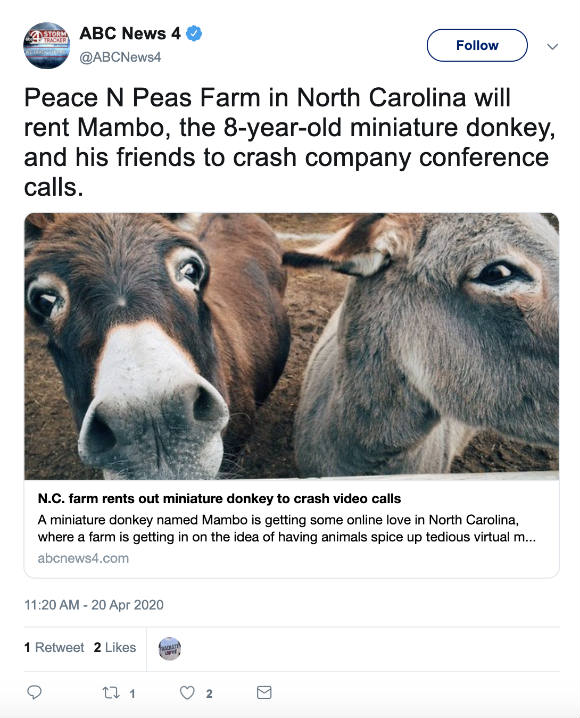
Copyright 2023 Nexstar Media Inc. All rights reserved. This material may not be published, broadcast, rewritten, or redistributed. Regular the hill posts
Video/Hill.TV












